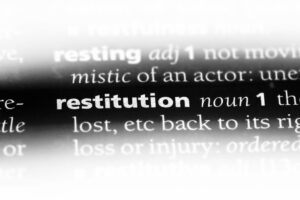
If you are convicted of a crime, odds are you’re going to feel the financial implications of the conviction in one way or another. You may have to pay a lawyer or deal with increases to your car insurance premiums depending on your crime, but there’s also the possibility that you’ll be ordered to pay a fine or restitution. But what do these two payments involve, and how do they differ? We look at the difference between paying a fine and paying restitution in today’s blog.
Fines Vs. Restitution
In almost all criminal cases that end in a conviction or a plea other than innocent, the defendant will be ordered by the judge to pay a fine. This fine typically covers some general court costs, a chemical assessment fee, surcharges and a fee if you went with a public defender. This fine is determined based on the severity of the charge and the defendant’s ability to pay.
These fines are paid to the state and tend to be capped at certain amounts. For example, in Minnesota, the maximum fine amount for a misdemeanor crime is $1,000. Gross misdemeanor fines can go up to $3,000, and monetary fines increase from there in the event you are convicted of a felony.
Restitution is a little different, but it still involves money coming out of your wallet and going to someone else. Restitution is money that you pay to a victim as a result of your actions. If there is no specific victim, like if you committed Medicare or welfare fraud, you may be required to pay restitution to a state restitution fund. If you took something, damaged something or forever changed the life of someone else, you may be ordered to help offset this loss through financial restitution, even if the damages were more than just property. For example, you may be ordered to pay restitution to a victim for:
- Defacing their property
- Stealing their property
- Causing injury or death to a loved one
- Lost income for yourself or a family member
- Medical bills
- Costs of services to physically, mentally or emotionally deal with the fallout of the incident
Simply put, if you suffered a financial loss due to someone else’s actions, they may be required to pay back a set amount as determined by a judge. It is helpful to have receipts or an itemized list of the financial impact someone else’s actions have had on your family if pursuing restitution, but we understand that not everything has a clear dollar amount.
In other instances, a person may be ordered to return, repair or replace items they damaged during the crime as a form of restitution. The specifics of your case and payments will be made clear by the judge. You can appeal any fine or restitution amount, but you’ll want to have a defense lawyer by your side, because the odds will be stacked against you.
For more information, or for help with your criminal case, reach out to Avery and the team at Appelman Law Firm today at (952) 224-2277.





